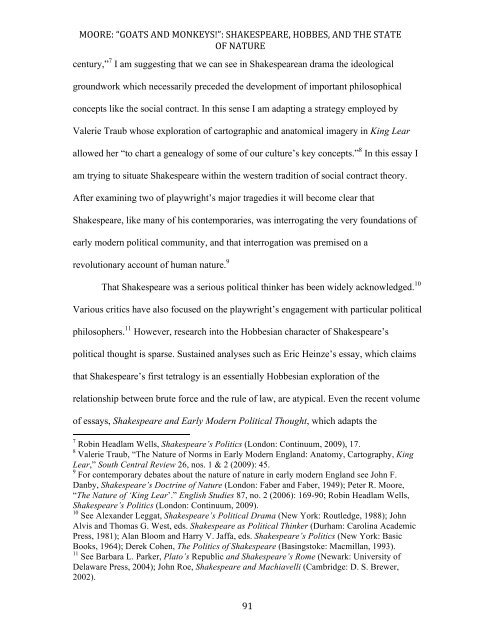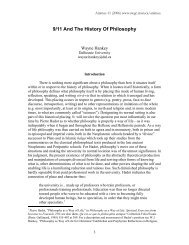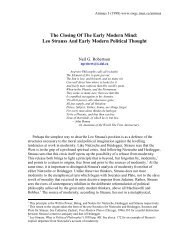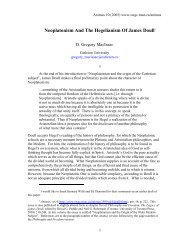âgoats and monkeys!â: shakespeare, hobbes, and the state of nature
âgoats and monkeys!â: shakespeare, hobbes, and the state of nature
âgoats and monkeys!â: shakespeare, hobbes, and the state of nature
You also want an ePaper? Increase the reach of your titles
YUMPU automatically turns print PDFs into web optimized ePapers that Google loves.
MOORE: “GOATS AND MONKEYS!”: SHAKESPEARE, HOBBES, AND THE STATE <br />
OF NATURE <br />
century,” 7 I am suggesting that we can see in Shakespearean drama <strong>the</strong> ideological<br />
groundwork which necessarily preceded <strong>the</strong> development <strong>of</strong> important philosophical<br />
concepts like <strong>the</strong> social contract. In this sense I am adapting a strategy employed by<br />
Valerie Traub whose exploration <strong>of</strong> cartographic <strong>and</strong> anatomical imagery in King Lear<br />
allowed her “to chart a genealogy <strong>of</strong> some <strong>of</strong> our culture’s key concepts.” 8 In this essay I<br />
am trying to situate Shakespeare within <strong>the</strong> western tradition <strong>of</strong> social contract <strong>the</strong>ory.<br />
After examining two <strong>of</strong> playwright’s major tragedies it will become clear that<br />
Shakespeare, like many <strong>of</strong> his contemporaries, was interrogating <strong>the</strong> very foundations <strong>of</strong><br />
early modern political community, <strong>and</strong> that interrogation was premised on a<br />
revolutionary account <strong>of</strong> human <strong>nature</strong>. 9<br />
That Shakespeare was a serious political thinker has been widely acknowledged. 10<br />
Various critics have also focused on <strong>the</strong> playwright’s engagement with particular political<br />
philosophers. 11 However, research into <strong>the</strong> Hobbesian character <strong>of</strong> Shakespeare’s<br />
political thought is sparse. Sustained analyses such as Eric Heinze’s essay, which claims<br />
that Shakespeare’s first tetralogy is an essentially Hobbesian exploration <strong>of</strong> <strong>the</strong><br />
relationship between brute force <strong>and</strong> <strong>the</strong> rule <strong>of</strong> law, are atypical. Even <strong>the</strong> recent volume<br />
<strong>of</strong> essays, Shakespeare <strong>and</strong> Early Modern Political Thought, which adapts <strong>the</strong><br />
7 Robin Headlam Wells, Shakespeare’s Politics (London: Continuum, 2009), 17.<br />
8 Valerie Traub, “The Nature <strong>of</strong> Norms in Early Modern Engl<strong>and</strong>: Anatomy, Cartography, King<br />
Lear,” South Central Review 26, nos. 1 & 2 (2009): 45.<br />
9 For contemporary debates about <strong>the</strong> <strong>nature</strong> <strong>of</strong> <strong>nature</strong> in early modern Engl<strong>and</strong> see John F.<br />
Danby, Shakespeare’s Doctrine <strong>of</strong> Nature (London: Faber <strong>and</strong> Faber, 1949); Peter R. Moore,<br />
“The Nature <strong>of</strong> ‘King Lear’.” English Studies 87, no. 2 (2006): 169-90; Robin Headlam Wells,<br />
Shakespeare’s Politics (London: Continuum, 2009).<br />
10 See Alex<strong>and</strong>er Leggat, Shakespeare’s Political Drama (New York: Routledge, 1988); John<br />
Alvis <strong>and</strong> Thomas G. West, eds. Shakespeare as Political Thinker (Durham: Carolina Academic<br />
Press, 1981); Alan Bloom <strong>and</strong> Harry V. Jaffa, eds. Shakespeare’s Politics (New York: Basic<br />
Books, 1964); Derek Cohen, The Politics <strong>of</strong> Shakespeare (Basingstoke: Macmillan, 1993).<br />
11 See Barbara L. Parker, Plato’s Republic <strong>and</strong> Shakespeare’s Rome (Newark: University <strong>of</strong><br />
Delaware Press, 2004); John Roe, Shakespeare <strong>and</strong> Machiavelli (Cambridge: D. S. Brewer,<br />
2002).<br />
91
















